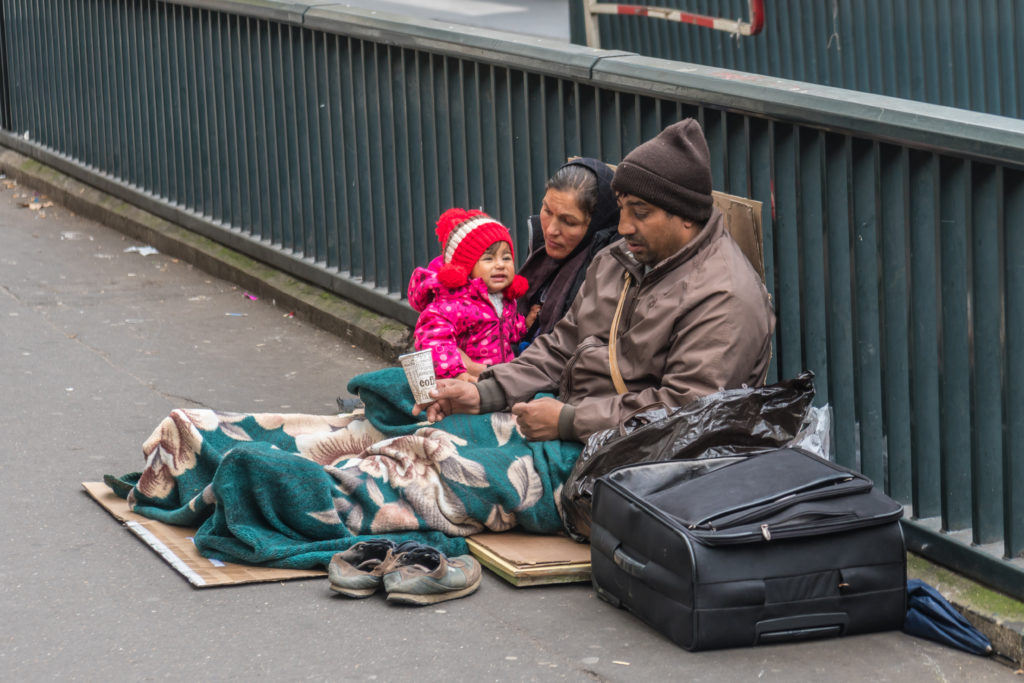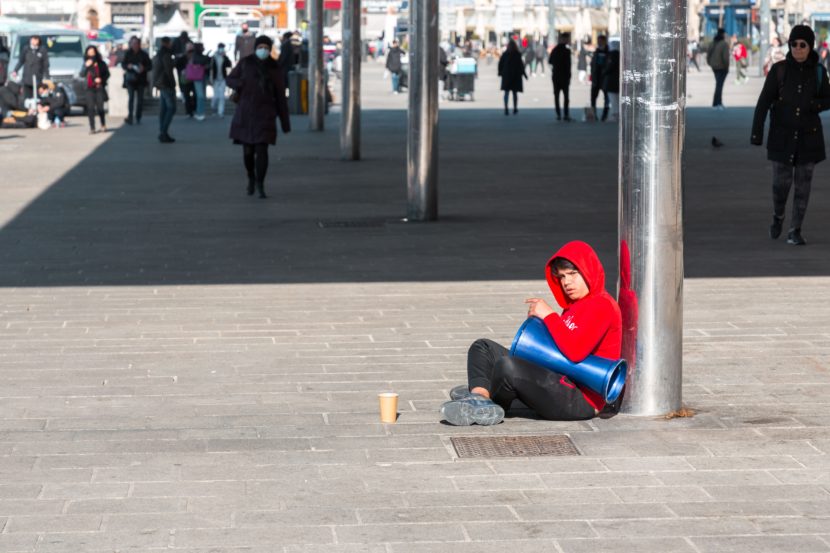Although France is considered in Europe to be a rich country that safeguards human rights, it is home to many people, especially children, who live in an alarmingly precarious situation, threatened by social exclusion on a daily basis. European regulations and France’s commitments may purport to guarantee children’s rights and access to essential services, but reality falls short of these legal promises. Furthermore, a discriminatory recent law makes migrant children even more vulnerable, thus at odds with the country’s commitment to safeguarding children’s well-being.
The child poverty rate in France
There are 14.47 million children in France, 22.8% of whom were at risk of poverty and social exclusion in 2021. This figure amounts to roughly 3,3 million children in total (Eurochild, 2022). UNICEF has also reported rising poverty – ‘characterised by the combination of low income and acute material and social deprivation’ – and growing insecurity among families (UNICEF, 2022).
In France, the term ‘poverty’ generally refers to financial poverty and living conditions (UNICEF, 2022). Indeed, poor children face obstacles in their access to education, healthcare, adequate food, decent housing and care services for young children (UNICEF, 2022).
European Child Guarantee
Poverty and social exclusion threaten about 19 million children in the European Union. In light of this worrying observation, and since children and young people are particularly affected by a number of health, economic and humanitarian crises, along with wars and armed conflicts, the European Commission adopted a recommendation from the European Council creating a child guarantee on March 24, 2021 (UNICEF, 2021). This measure aims to ‘promote equal opportunities and end the vicious cycle of children’s poverty and social exclusion by ensuring that they have effective access to quality basic services’ (UNICEF, 2021).
Indeed, the aim of this European Child Guarantee is ‘to prevent and fight social exclusion by ensuring children in need have effective access to a range of basic services, such as adequate free education and care facilities; free schooling (including after-school activities and at least one healthy school meal per day); free healthcare; healthy food; and adequate housing’ (European Commission, n.d.).
To ensure that this guarantee is respected, the European Council has called for member states to submit action plans setting out the arrangements of its implemention. These plans have to cover the period up to 2030 and ‘take into account national, regional and local circumstances, as well as existing strategic measures and actions that aim to support children in need’, in order to improve their access to all key basic services (European Commission, n.d.).
Child protection in France
Child protection aims to ‘guarantee that the fundamental needs of children are taken into account; support their physical, emotional, intellectual and social development; and protect their health, security, morality and education’ (Ministry of Labour, Health and Solidarity, n.d.). This definition is determined by article L. 112-3 of the Social Action and Family Code.
Moreover, child protection has been overhauled and fundamental children’s rights reaffirmed in France by the Child Protection Act n°2016-297, promulgated on March 14, 2016, and the Child Protection Act n°2022-140, promulgated on February 7, 2022 (Légifrance, 2016 and 2022).
Furthermore, by adopting the Childhood Guarantee on June 14, 2021, France started to enforce this guarantee at a national scale, through an action plan for the period from 2022 to 2030. This is a real opportunity for European states, including France, to construct ‘public policy to prevent and fight poverty and social exclusion’, and to contribute significantly ‘to ‘the protection and promotion of children’s rights’ (UNICEF, 2021).
Since this action plan was devised, France has committed to taking real action to ‘improve already existing monitoring tools used in the fight against poverty and social exclusion affecting children, and to create new ones’. It also committed to enforcing this plan locally in association with ‘officials and local partners’ (Secretariat for European Affairs, 2022).
The impact of the 2024 immigration law on migrant children

Poverty can take numerous forms and particularly affects the most vulnerable groups, which include children. Across the world, refugee and migrant children take the brunt of poverty. Indeed, whether they are ‘with family or on their own, they migrate to flee violence, destitution and poverty, and hope to be welcomed into a country that will be able to protect them’, but they will nonetheless not be relieved from poverty once they arrive in Europe (UNICEF, n.d.).
In compliance with international law and basic children’s rights, ‘all migrant children, whether refugees or not, have the right to be protected, live in a safe environment, be educated, and not be subject to discrimination.’ In France, analyses show that this is far from being the case. These children even sometimes find themselves ‘without accommodation, or unable to access healthcare or education’ (UNICEF, n.d.).
It is against the backdrop of an already acute insecurity for migrant children that, on January 26, 2024, France adopted Act n°2024-42 to control immigration and improve integration (Légifrance, 2024). Among the troubling provisions of this law, one clearly stands out: the conditioning of almost all family benefits for foreigners can receive on ‘a presence of at least five years on French soil, or a minimum period of professional activity’. This measure will have a detrimental impact, since it will limit the benefits meant for children’s education and housing, and will worsen their already precarious living conditions (Reporterre, 2024).
Even though this law was only adopted by the French government in early 2024, and was reexamined in accordance with a recent ruling by the French Constitutional Council, many organisations and studies are already reporting that ‘the number of people who would be deprived of their social rights, regardless of their equal contribution to the system, and based only on their place of birth or on their parents’ nationality, could reach 110,000, of whom 30,000 would be children’ (Le Monde, 2024; Reporterre, 2024).
Numerous migrant families and children, though already in a precarious situation, will end up in extreme poverty. This alarming observation is likely to concern more than half the children affected by the national preference promoted in this law (Reporterre, 2024).
Still a long way to go
The endorsement of children’s rights in French legislation and directives is of paramount importance, but France is also bound to ensure that they are enforced, and to monitor the corresponding indicators rigorously, in order to fight the poverty and social exclusion that threaten children.
France must strive to guarantee, without distinction of any kind, that it will:
- Create a public service designed to protect young children;
- Assist each child who is out of school due to financial insecurity, and remove administrative hurdles that prevent them from attending school;
- Make sure each child has access to an affordable healthy meal on each school day;
- Provide equal access to healthcare services;
- Provide unconditional and respectful shelter for homeless families and children; (UNICEF, 2022)
- Ensure children’s psychosocial well-being at school but also elsewhere, thanks to appropriate social service units;
- Remove any barriers limiting children’s access to social services and benefits, and ensure that they are given equal access to such services;
- Generally speaking, provide equal treatment in legislation and in practice to all children on French soil.

Humanium condemns this legal regime that allows discrimination against children in their access to basic social services. Humanium strives to create a world where children’s rights to education and health are always respected. If you wish to support our cause, you may consider donating, volunteering or becoming a member.
Written by Moïra Phuöng Van de Poël
Translated by Catheline Hannier
Proofread by Alex Macpherson
Bibliography:
Commission européenne (n.d.). Garantie européenne pour l’enfance. Extrait de la Commission européenne à https://ec.europa.eu/social/main.jsp?catId=1428&langId=fr, consulté en février 2024.
Direction de la Recherche, des études, de l’évaluation et des statistiques (n.d.). Protection de l’enfance et de l’adolescence. Extrait de la Direction de la Recherche, des études, de l’évaluation et des statistiques à https://drees.solidarites-sante.gouv.fr/protection-de-lenfance-et-de-ladolescence, consulté en février 2024.
Eurochild (2022). Country Profle 2022 – France. Extrait d’Eurochild à https://eurochild.org/uploads/2023/01/France_Invisible-children-Eurochild-2022-report-on-children-in-need-across-Europe.pdf, consulté en février 2024.
Le Monde (2024, Janvier 26). Loi « immigration » : ajouts, durcissement, censure… toutes les évolutions du texte, du projet initial à la version finale. Extrait du Monde à https://www.lemonde.fr/les-decodeurs/article/2024/01/26/loi-immigration-ajouts-durcissement-censure-toutes-les-evolutions-du-texte-du-projet-initial-a-la-version-finale_6205115_4355771.html#, consulté en février 2024.
Légifrance (2016). Journal Officiel. Extrait de Légifrance à https://www.legifrance.gouv.fr/jorf/id/JORFTEXT000032205234#:~:text=%C2%AB%20Art.,le%20respect%20de%20ses%20droits, consulté en février 2024.
Légifrance (2022). Journal Officiel. Extrait de Légifrance à https://www.legifrance.gouv.fr/jorf/id/JORFTEXT000045133771, consulté en février 2024.
Légifrance (2024). Journal Officiel. Extrait de Légifrance à https://www.legifrance.gouv.fr/jorf/id/JORFTEXT000049040245, consulté en février 2024.
Ministère du travail, de la santé et des solidarités (n.d.). Protection de l’enfance. Extrait du Ministère du travail, de la santé et des solidarités à https://sante.gouv.fr/archives/archives-affaires-sociales/familles-enfance/protection-de-l-enfance-10740/#:~:text=Qu’est%2Dce%20que%20la,sa%20moralit%C3%A9%20et%20son%20%C3%A9ducation, consulté en février 2024.
Reporterre (2024, Janvier). Que changerait la “préférence nationale” induite par la loi immigration, Extrait de Reporterre à https://reporterre.net/IMG/pdf/rapport_nos_services_publics.pdf, consulté en février 2024.
Secrétariat général des affaires européennes (2022). Plan d’action 2022-2030 pour la mise en œuvre de la Recommandation (UE) 2021/1004 du Conseil du 14 juin 2021 établissant une Garantie européenne pour l’enfance. Extrait du Secrétariat général des affaires européennes à https://www.cnape.fr/documents/secretariat-general-des-affaires-europeennes_-plan-daction-2022-2030-pour-la-mise-en-oeuvre-de-la-recommandation-ue-2021-1004-du-conseil-du-14-juin-2021-etablissant-une-garantie-europeenne/, consulté en février 2024.
UNICEF (2022). Enfants pauvres en France. Extrait d’UNICEF à https://www.unicef.fr/convention-droits-enfants/inclusion-sociale/enfants-pauvres-monde/enfants-pauvres-france/, consulté en février 2024.
UNICEF (2021). Lutte contre la pauvreté : les enfants doivent être au coeur des politiques, Extrait d’UNICEF à https://www.unicef.fr/article/la-garantie-pour-l-enfance-une-opportunite-pour-lutter-contre-la-pauvrete-des-enfants/, consulté en février 2024.
UNICEF (n.d.). La précarité. Extrait d’UNICEF à https://my.unicef.fr/precarite/, consulté en février 2024.
UNICEF (n.d.). Les enfants migrants. Extrait d’UNICEF à https://my.unicef.fr/enfants-migrants/, consulté en février 2024.
Vie publique (2024, Janvier 16). Protection de l’enfance : de l’aide aux familles à la défense de l’intérêt de l’enfant. Extrait de Vie publique à https://www.vie-publique.fr/eclairage/18716-protection-de-lenfance-comment-mieux-defendre-linteret-de-lenfant#:~:text=stock.adobe.com-,Protection%20de%20l’enfance%20%3A%20de%20l’aide%20aux%20familles,l’int%C3%A9r%C3%AAt%20de%20l’enfant&text=Deux%20lois%20, consulté en février 2024.


